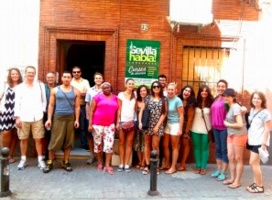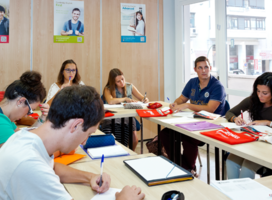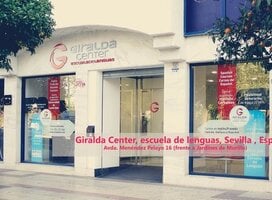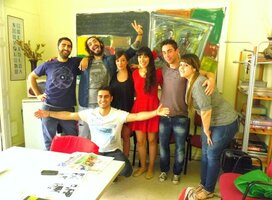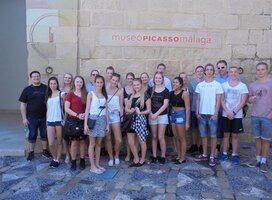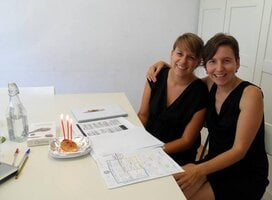Spanish Language Schools in Seville, Spain
Everything you think of when you think of Spain can be found in Seville: sangria, flamenco dancers and bullfighting. For that reason, choosing Seville to learn Spanish means choosing authenticity, because even though it’s the country’s fourth-largest city, you won’t hear a lot of English on the street.
However, it’s worth noting that studying in Seville also means learning Spanish in a region known for its thick accent. Don’t worry though, you’ll quickly get accustomed to Sevillanos’ tendency to drop the (not so occasional) consonant or syllable, and get the chance to benefit from the other thing that Sevillanos are known for: generosity, openness, and patience with foreigners’ language skills.
Why Learn Spanish in Seville?
Seville’s motto is plastered on every manhole cover and lamppost of the city: No me ha dejado, or “Seville has not abandoned me.” The phrase references the Andalusian capital’s loyalty to King Alfonso X during a power struggle with his son in the 13th century; however, you’re likely to adopt this motto yourself, as the city will never abandon your heart once you step foot within its walls.
After all, in the city where Columbus set sail to travel to the Americas, the city with the largest Gothic cathedral in the world, and a city where it rarely drops below freezing, it’ll be hard not to. Beyond that, the locals’ patience and friendliness and Seville’s relatively small expat community makes it’s an excellent place to learn Spanish and experience Spanish culture to its fullest. Ready to learn Spanish in Seville, Spain?
When choosing a language program in Seville, remember that the more immersed you are, the faster your Spanish will improve. While there isn’t as big of an expat community in Seville as in many other European cities, there are hundreds of foreign students roaming around the city center at any given time.
So, evaluate your priorities and consider housing setup, hours and types of classes available, program length, and cultural/extracurricular activities and trips that are included.
Study Abroad Programs
There are many study abroad programs with a focus on learning Spanish available in Seville. Usually, these are intended for university students with some background knowledge of Spanish.
Students on these programs often have the opportunity to take courses in various academic fields, taught in Spanish. Many programs have various types of courses available, including some via a partnership with either the Universidad de Pablo Olavide or the Universidad de Sevilla, both of which have course offerings specifically catered to foreign students. There are dozens of program providers that vary in academic focus and set-up, extracurricular opportunities and housing arrangements.
For Spanish learners with a lower level, the Universidad de Pablo de Olavide offers an exchange program focused specifically on language development during the fall semester for college students with only one or two semesters of Spanish under their belts.
Private Language Academies
For Spanish beginners or linguistically-focused students of all ages, there are many language academies in Seville that offer a menu of programs, from general Spanish (for teens or adults) to business or medical Spanish to classes focused on preparation for an official Spanish Language Certificate (DELE). Many of these academies also offer choices regarding accommodation and length of study.
Language Exchange / Intercambio
Though not a course per say, one of the best ways to improve your Spanish outside of the classroom and become more immersed in the local culture is to sign up for intercambios, or language exchanges, with sevillanos. There are two common set-ups: some take place at a bar, where locals and foreigners meet informally to have a drink and chat in multiple languages (consult sites like MeetUp).
Or, you can find a conversation exchange language exchange partner to meet with at a mutually agreed upon time, location and frequency. Another popular option for cultural immersion is taking dance classes to learn the most important dance of Seville, aptly named sevillanas.
Seville is a fun loving, laid back city that gets most serious when it comes to keeping up local traditions. It is said that Spanish social life, especially in the south, is lived on the street rather than inside the homes, as people of all ages tend to stop and smell the roses orange blossoms, enjoying leisurely drinks on sidewalk cafés and meandering walks at all hours of the day and night.
Be prepared for hot (100° F or higher) summers, temperate and rainy winters, and no shortage of events to occupy your time, regardless of the weather. A few suggestions:
Semana Santa & Feria: Arguably the two most important weeks in Seville are Semana Santa (Holy Week) and Feria (the city’s fair). Both are in the springtime, usually in March and April. Semana Santa offers eight days of somber yet elaborate processions through the city streets depicting the Virgin Mary and the events of the Passion, while Feria is a week of dancing, drinking, eating and flamboyant clothing.
The white towns: Scattered throughout Andalusia, mostly in the provinces of Málaga and Cádiz (reachable by bus or train from Seville), you will find many villages that are comprised exclusively of whitewashed buildings with brown tiled roofs, a combination that is truly a treat for the eyes.
La Alameda de Hércules: The immediate city center has so much to offer, that many visitors never make it to the Alameda neighborhood, but it’s their loss, as it’s the epicenter of Seville’s innovative cuisine and diverse nightlife.
Highlights
Check out the crowd: Seville is home to about 700,000 people, only about 5% of whom are foreign-born, so Spanish is far and away the predominant language spoken in the city
Did you know that some of Seville’s most important monuments have been featured in blockbusters such as Star Wars II: Attack of the Clones and Lawrence of Arabia?
Since when? Seville (then known as Hispalis) was founded by Julius Caesar in 49 BC; the Spanish language slowly evolved from Latin, first becoming standardized in the 13th century
Don’t miss spending a day getting lost in the winding streets of El Barrio de Santa Cruz, the old Jewish quarter
YUM: Beyond the ham, olive oil and wine one should consume anywhere in Spain, when in Seville, be sure to try gazpacho (a cold tomato-based soup), rabo de toro (oxtail), and agua de Sevilla (a strong cocktail topped with whipped cream and cinnamon)
Student Resources
Most of Seville can be reached on foot, but if you live outside of the immediate city center (or even if your apartment is right downtown), considering signing up for Sevici (public bikes) instead of using buses, the metro or taxis: an annual subscription costs just over $40.
In terms of housing, if your program doesn’t provide it and you need to apartment hunt, it’s best to book a hostel or room on AirBnB, for your first week and look for a place when you arrive (using sites like Idealista or UniPlaces); the turnaround is fast and trying to secure an apartment from overseas is not worth the hassle.
For Spanish learners taking courses through a private language institute, you'll likely have the option to purchase housing as part of your course fee, or to select something on your own.
Life in Seville is affordable for Spain. Rooms in shared apartments can be rented for less than $275/month, while the average one-bedroom apartment in the city center hovers around $700.
Cell phone plans, even with data, are a fraction of their cost in the States, and groceries are also significantly cheaper (to get an idea, a liter of milk costs around $1).
If you're staying longer than a couple of weeks and want to make some extra cash while living in Seville, your options are limited, because there is a lot of red tape involved in finding legal work while in Spain on a student or tourist visa (which is completely fine if you'll be in Seville for less than 90 days). You can, however, tap into the thriving market of private English tutoring; find students via word of mouth, posters around your neighborhood, or online at Tus Classes Particulares.

